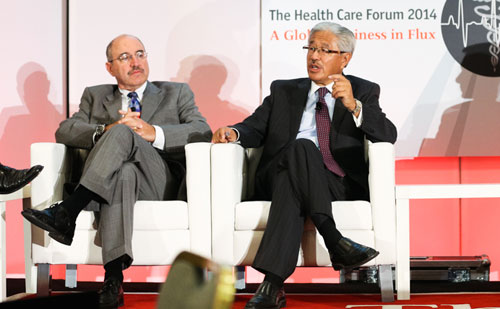A Harvard professor and the president of the Institute of Medicine stressed that Western healthcare companies need to think differently as they seek to expand in the developing world.
September 22, 2014

By Tom Salemi
Berman (left) and Dzau (right) speak at the Economist's Health Care Forum in Boston last week. |
Nearly every major medical device manufacturer—if not all of them—have identified the “emerging markets” as their principal source of revenue growth in the coming years. But tapping into that current will take a deft hand and keen eye as what emerges from these countries may not be the acute-care-based system seen in developed countries.
A discussion at the Economist’s Health Forum in Boston last week explored the risks and challenges associated with rising demands for healthcare. Patients in emerging economies are rightly demanding better access to healthcare, and U.S.-based companies and investors are working diligently to meet that demand by constructing acute-care facilities like the ones that serve as the center of the healthcare system in United States, Europe, and other developed nations.
But there’s growing concern that this model isn’t sustainable or even necessary to meet the healthcare needs in many cultures. Peter Berman, a professor at Harvard University’s School of Public Health, said simply replicating a hospital-based system in less-developed nations requires not only new infrastructure, but wholesale change in the behavior and practice of patients and physicians. Such mimicry will also demand a financial investment that even Western nations are having difficulty paying.
“Our systems evolved from an environment where resources were rising rapidly. The resources were available and the technology rose to meet that availability. But that is not going to be the situation in most of the rest of the world,” Berman said, adding that countries in Asia don’t have those same resources. “They have to find ways to take advantage of the best technologies but in ways that don’t have the costs, especially the costs of the hospital-based delivery systems that we’ve developed in the West. And we’re seeing in the West that we’re developing those strategies already in response to our own cost constraints.”
These countries will need to “leap-frog” the United States by creating “more of an outpatient-oriented and prevention-oriented delivery system” that will require behavioral changes by physicians and patients to treat the “emerging non-communicable disease epidemics,” Berman said.
Victor Joseph Dzau, MD, president of the Institute of Medicine, brought an academic, clinical, and corporate perspective to what he says is a complex question. Dzau previously served as president and CEO of Duke University Health Systems, where he oversaw the school’s creation of the Duke Translational Medicine Institute, Duke Global Health Institute, and Duke Institute of Health Innovation. Through these efforts, Duke created medical schools and research institutes in Singapore, China, India, and the Middle East. Dzau has also served on the corporate boards of Medtronic Inc., Alnylam Pharmaceuticals Inc., Genzyme Corp., and PepsiCo.
Dzau said the only thing that’s universally true about the globalization of healthcare is that there’s no single answer. Every country and every culture within a country is different and needs specific solutions. “You won’t succeed unless you are really on the ground and really understand the culture . . . Globalization is not Americanization,” Dzau said.
Device companies must create local solutions to local problems in order to succeed. “So many businesses are thinking how do we actually transport our product overseas? How do we teach them to run hospitals? The truth of the matter is we need to ask the question, ‘What do people need and how can we help?’” Dzau said.
Still, Dzau said private enterprise must be part of the solution. “You need private entrepreneurs there to drive innovation because government can barely meet the needs of people in Asia and China. But innovators are going to come in with low-cost solutions that are closer to the patients,” he said.
The adoption of new approaches will require a significant change in the global mindset about what qualifies as quality care, Berman added.
“The U.S. has been seen globally from a technical point of view in medicine as the apex of quality,” he said. “The medicine practiced here is [seen as being] at the cutting edge, and that has been a cultural influence on providers and citizens all over the world. How do we make that transition to think differently about quality?”
Quality historically has been measured by having the most technology and the most intervention, Berman said. But quality should be seen as having the “appropriate balance of technology and intervention” that improves healthcare outcomes, he added. “How do we have people perceive that and providers perceive that as somehow being second-class medicine? I think that is a big cultural change that has to take place.”
Tom Salemi is a freelance contributor to MD+DI.
You May Also Like


